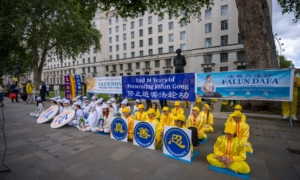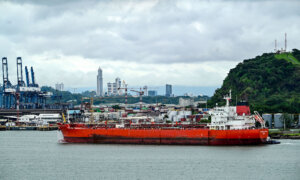China’s dominance in the maritime industry is “unreasonable” and “restricts U.S. commerce,” the Office of the U.S. Trade Representative (USTR) said on Jan. 16 following months of investigation.
The USTR, which launched the investigation in April last year in response to a petition filed by a group of labor unions, said China’s targeted dominance of the global shipbuilding, maritime, and logistics sectors is “actionable” under U.S. trade law.
The office did not offer any recommendations on how Beijing should be penalized, leaving President-elect Donald Trump to decide what to do next.
“Beijing’s targeted dominance of these sectors undermines fair, market-oriented competition, increases economic security risks, and is the greatest barrier to [the] revitalization of U.S. industries, as well as the communities that rely on them,” U.S. Trade Representative Katherine Tai said in a statement on Thursday.
Tsai pointed out that the United States now builds fewer than five ships annually, down from more than 70 ships a year in 1975, while China now builds more than 1,700 annually. In other words, the United States has fallen from the No. 1 global rank in commercial shipbuilding decades ago to No. 19 today, Tai added.
“These findings under Section 301 set the stage for urgent action to invest in America and strengthen our supply chains,” she said.
Trump’s first-term China tariffs were also based on a USTR Section 301 investigation, which found that the Chinese regime engaged in illegal practices, including excessive government subsidies and intellectual property theft.
In an 182-page report detailing its investigation, USTR stated that the Chinese Communist Party (CCP) had “extraordinary control” over Chinese companies in the maritime sector, influencing their “commercial behavior in pursuit of its targeted dominance.”
USTR stated that Beijing provided $5 billion in direct subsidies to Chinese shipping, shipbuilding, and port management companies between 2010 and 2018. During the same period, Chinese state-owned banks provided $127 billion in financing to companies in the shipping and shipbuilding sectors.
Due to the lack of available data, USTR stated that it was difficult to determine the scale of China’s state financial support.
“This opaqueness allows for China to hide the true extent of government support to the maritime, logistics, and shipbuilding sectors,” the report reads.
Chinese companies in these sectors have also benefited from other non-market advantages, such as China’s excess capacity in steel, lack of adequate labor rights, the use of forced or compulsory labor, and control over digital logistics services.
“The entrenchment of China’s dominance means that U.S. international trade would be ‘carried out on vessels made in China, financed by state-owned Chinese institutions, owned by Chinese shipping companies, and reliant on a global maritime and logistics infrastructure increasingly dominated by China,’” the USTR report reads, quoting from the unions’ petition.
‘Undeniable Indictment’
The unions that filed the petition include the United Steelworkers (USW) and the International Brotherhood of Boilermakers, Iron Ship Builders, Blacksmiths, Forgers, and Helpers (IBB).The USW called the USTR report “a firm and undeniable indictment, requiring a swift, decisive response,” according to a Jan. 16 press release. The union said the decision to hold China accountable will fall on the incoming Trump administration.
“President Donald Trump has already indicated a willingness to hold the PRC accountable and has said that our maritime industries have ‘suffered tremendously,’” the USW said.
Trump has suggested placing 60 percent tariffs on all Chinese imports and an additional 10 percent for Beijing’s broken promise on illicit fentanyl control.
Timothy Simmons, president of the IBB, said that “China’s predatory actions in the logistics, maritime,
and shipbuilding sectors demonstrate a clear and unambiguous intent to dominate global markets to the detriment of American workers, employers, and our national security,” according to a statement.
“We hope the incoming administration will build upon the clear findings of this report and implement strong remedies that level the playing field for American workers in the shipbuilding and maritime sector,” Simmons added.
Several members of Congress took to social media platform X to support the USTR report’s findings.
“The CCP has been breaking the rules and hurting American companies and workers,” Rep. Chris Deluzio (D-Pa.) wrote on Jan. 17. “I urge swift action to fight back and grow our domestic shipbuilding, invest in American workers and industry, and break off our supply chains from the CCP.”
Reuters contributed to this report.














